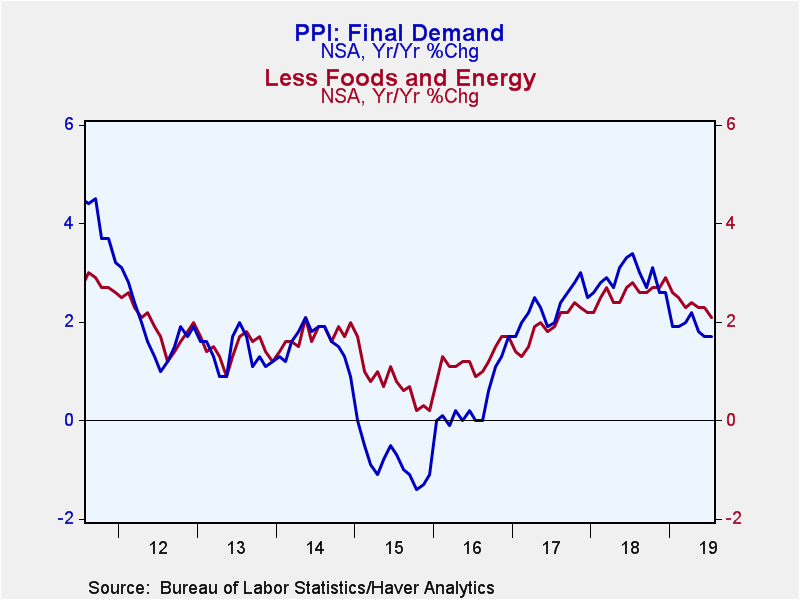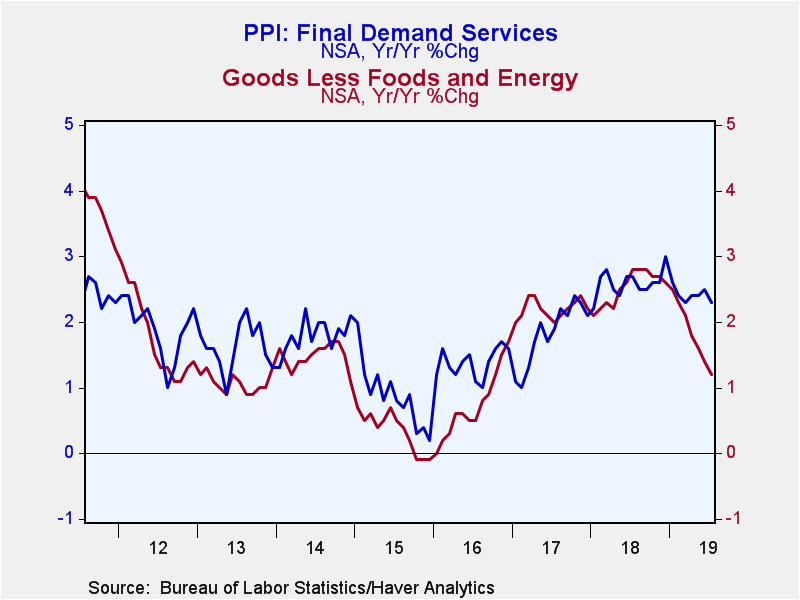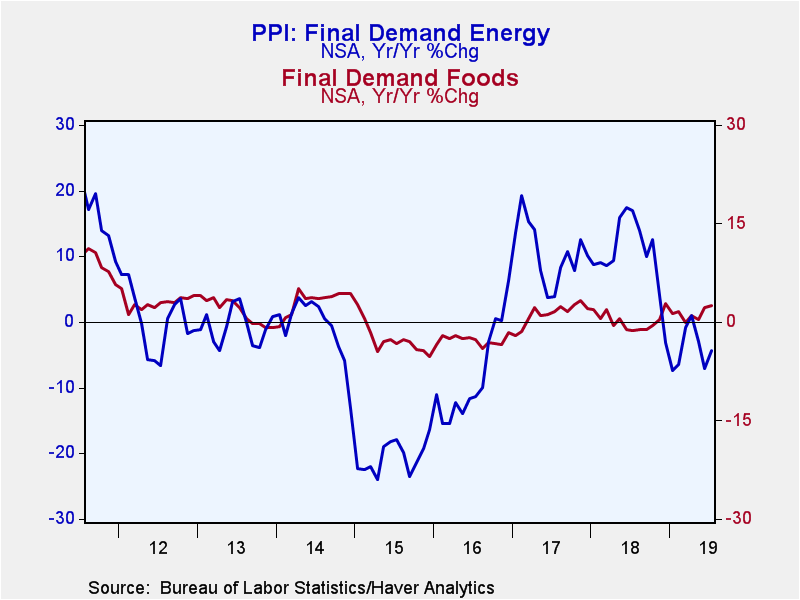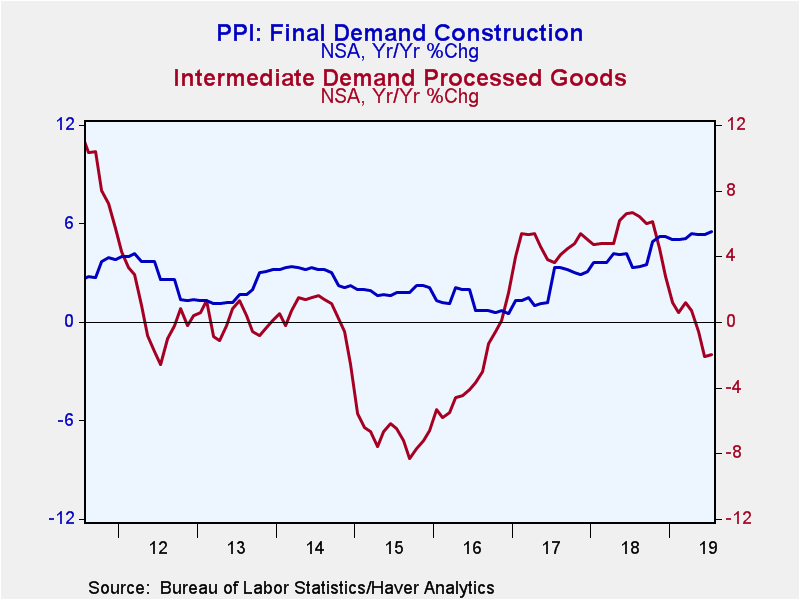 Global| Aug 09 2019
Global| Aug 09 2019U.S. Producer Price Index Increases; Core Prices Ease
by:Tom Moeller
|in:Economy in Brief
Summary
The Producer Price Index for final demand rose 0.2% during July (1.7% y/y) following two months of 0.1% gain. The rise matched expectations in the Action Economics Forecast Survey. Producer prices excluding food & energy slipped 0.1% [...]
The Producer Price Index for final demand rose 0.2% during July (1.7% y/y) following two months of 0.1% gain. The rise matched expectations in the Action Economics Forecast Survey. Producer prices excluding food & energy slipped 0.1% last month (+2.1% y/y) after a 0.3% strengthening. A 0.2% rise had been expected. The PPI excluding food, beverages and trade services, another measure of underlying price inflation, also edged 0.1% lower (+1.7% y/y) after holding steady in June.
A 2.3% rise (-4.4% y/y) in energy prices added to the PPI increase following two months of subtraction. The rise reflected a 5.2% rebound (-6.7% y/y) in gasoline prices after two months of decline. Home heating oil prices jumped 8.0% (0.2% y/y) following a 5.0% drop. The cost of electric power rose 0.9% (2.2% y/y) following a 0.4% gain. Offsetting these increases was a 1.3% decline (+1.3% y/y) in natural gas prices, which was the fourth consecutive decline.
Food prices edged 0.2% higher (2.5% y/y) following a 0.6% gain. Beef & veal prices increased 1.8% (1.7% y/y) while fish prices rose 3.0% (3.9% y/y). The cost of dairy products rose 0.6% (1.2% y/) and fresh & dried vegetable costs improved 0.3% (43.3% y/y). These increases were offset by a 4.1% decline (-7.2% y/y) in fresh fruit & melon prices. Egg prices were off 8.9% and down by roughly one-half y/y. Oilseed prices eased 0.3% (+2.7% y/y).
Prices for core goods for final demand edged 0.1% higher (1.2% y/y) after holding steady for three straight months. Core finished consumer goods prices rose 0.1% (2.2% y/y) after zero change in June. Core nondurable consumer goods costs also gained 0.1% (2.7% y/y) and durable consumer goods prices improved 0.1% (1.2% y/y) as well. Passenger car prices rose 0.4% both m/m and y/y but appliance prices fell 0.6%. Private capital equipment costs increased 0.2% (2.2% y/y) after two months of 0.1% gain. Government goods prices less food & energy rose 0.2% (1.9% y/y) following two months of 0.1% improvement.
Services prices fell 0.1% (+2.3% y/y), but trade services prices rose 0.2% (3.3% y/y) after strengthening 1.3%. The cost of trade of finished goods rose 0.2% (3.2% y/y) following a 1.4% surge. Passenger transportation fees increased 1.5% (5.5% y/y) and transportation & warehousing costs fell 0.3% (+2.1% y/y). Services prices less trade, transportation & warehousing were off 0.3% (+1.7% y/y).
Construction costs improved 0.6% (5.5% y/y). Private building costs gained 0.6% (5.2% y/y) but government building costs rose 0.4% (6.0% y/y) for a second month.
Prices for intermediate demand increased 0.2% (-2.0% y/y) following three months of decline.
The PPI data can be found in Haver's USECON database. Further detail can be found in PPI and PPIR. The expectations figures are available in the AS1REPNA database.
| Producer Price Index (SA, %) | Jul | Jun | May | Jul Y/Y | 2018 | 2017 | 2016 |
|---|---|---|---|---|---|---|---|
| Final Demand | 0.2 | 0.1 | 0.1 | 1.7 | 2.9 | 2.3 | 0.4 |
| Excluding Food & Energy | -0.1 | 0.3 | 0.2 | 2.1 | 2.6 | 1.9 | 1.2 |
| Excluding Food, Energy & Trade Services | -0.1 | 0.0 | 0.4 | 1.7 | 2.8 | 2.1 | 1.2 |
| Goods | 0.4 | -0.4 | -0.2 | 0.4 | 3.4 | 3.3 | -1.4 |
| Foods | 0.2 | 0.6 | -0.3 | 2.5 | 0.2 | 1.2 | -2.8 |
| Energy | 2.3 | -3.1 | -1.0 | -4.4 | 10.2 | 10.4 | -8.4 |
| Goods Excluding Food & Energy | 0.1 | 0.0 | 0.0 | 1.2 | 2.5 | 2.2 | 0.7 |
| Services | -0.1 | 0.4 | 0.3 | 2.3 | 2.6 | 1.8 | 1.4 |
| Trade Services | 0.2 | 1.3 | -0.5 | 3.3 | 1.8 | 1.4 | 1.3 |
| Construction | 0.6 | 0.2 | 0.0 | 5.5 | 4.0 | 2.2 | 1.1 |
| Intermediate Demand - Processed Goods | 0.2 | -1.1 | -0.2 | -2.0 | 5.3 | 4.7 | -3.1 |
Tom Moeller
AuthorMore in Author Profile »Prior to joining Haver Analytics in 2000, Mr. Moeller worked as the Economist at Chancellor Capital Management from 1985 to 1999. There, he developed comprehensive economic forecasts and interpreted economic data for equity and fixed income portfolio managers. Also at Chancellor, Mr. Moeller worked as an equity analyst and was responsible for researching and rating companies in the economically sensitive automobile and housing industries for investment in Chancellor’s equity portfolio. Prior to joining Chancellor, Mr. Moeller was an Economist at Citibank from 1979 to 1984. He also analyzed pricing behavior in the metals industry for the Council on Wage and Price Stability in Washington, D.C. In 1999, Mr. Moeller received the award for most accurate forecast from the Forecasters' Club of New York. From 1990 to 1992 he was President of the New York Association for Business Economists. Mr. Moeller earned an M.B.A. in Finance from Fordham University, where he graduated in 1987. He holds a Bachelor of Arts in Economics from George Washington University.
More Economy in Brief
 Global| Feb 05 2026
Global| Feb 05 2026Charts of the Week: Balanced Policy, Resilient Data and AI Narratives
by:Andrew Cates










